
I’ve Looked at Clouds that Way


 This summer, a group of women at my church are meeting to study the Psalms of Ascent.
This summer, a group of women at my church are meeting to study the Psalms of Ascent.
We are using Beth Moore’s study “Stepping Up†as our guide.
As we consider each psalm, she asks us to write our own version.
Today’s pilgrim psalm was Psalm 129.
These are the words that tumbled as out as a prayer from this wonderful psalm:
Meanwhile Jacob had settled down where his father had lived, the land of Canaan. 2 This is the story of Jacob. The story continues with Joseph, seventeen years old at the time, helping out his brothers in herding the flocks. These were his half brothers actually, the sons of his father’s wives Bilhah and Zilpah. And Joseph brought his father bad reports on them. 3-4 Israel loved Joseph more than any of his other sons because he was the child of his old age. And he made him an elaborately embroidered coat. When his brothers realized that their father loved him more than them, they grew to hate him—they wouldn’t even speak to him. Genesis 37, The Message
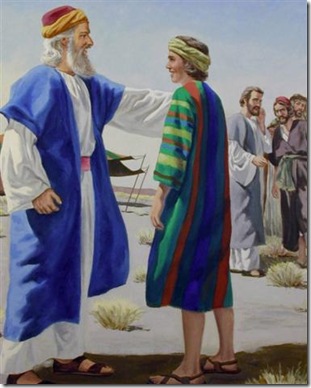 I have read the story of Joseph and his “technicolor dream coat” many times. As I read it, my mind has in view a snapshot of a fancy, multicolored striped tunic just like the ones I saw in the Sunday School pictures.
I have read the story of Joseph and his “technicolor dream coat” many times. As I read it, my mind has in view a snapshot of a fancy, multicolored striped tunic just like the ones I saw in the Sunday School pictures.
Recently while listening to a lecture by Dr. Doug Stuart, he pointed out that Genesis 37 is not telling the story of a little boy with a coat of many colors but is communicating that Jacob gave Joseph a long-sleeved coat.Â
For the reader, that was to signal that an inheritance ceremony was going on in this family. The long sleeved coat was normally given to the first born son symbolizing that he was the heir who would receive the double portion from the father.Â
The Genesis story is highlighting how upside down Jacob’s affections were for Joseph. As Jacob awards a younger son this great gift of inheritance, our hearts immediately resonate with the brothers who felt slighted and disowned by father Jacob.
Is there something else –something more hidden going on in this story? Was the author’s intent not only to shock the hearer with the sense of unfairness but also with how undeserving was Joseph for such a generous gift. Â
Running all through the Bible narrative, the Holy Spirit is weaving the tapestry of grace. So too in this family history, the author is pulling a “grace thread’ through the fabric of jealousy, hatred, and undeserved favoritism. The thread becomes clearer if we will stand in Joseph’s shoes rather than in the shoes of the offended brothers. Tim Keller is masterful in getting at the “grace thread” of Genesis 37. Â
“Suffering all by itself can ruin you, but suffering plus an absolute assurance of the love of God can turn you into something great, absolutely great. Well some of us say, “That’s nice, except that’s not what happens is it?â€Â Because when bad things come in your life, you know what happens:
When suffering comes into your life, almost immediately you struggle with this, you say “Maybe I am not living right. Maybe I am not doing right.†When suffering comes into your life, you have less assurance that God loves you. You feel like “God has abandoned me,” so how the heck is this going to work? It doesn’t make sense. Â
If George Herbert is right in saying, “If I had joyous coat, if I had the coat of the Father on me, then suffering I can handle it.” How do you get it? Here’s how you get it. The pattern of salvation in Joseph’s life was so weird to his brothers. It’s so against the world’s thinking, but that is because it points to the ultimate pattern of salvation. Â
You see, centuries later another one came to his brethren, “to his own and they received him notâ€. Another one was sold for silver, and betrayed by the people closest to him. It was another one who was stripped naked, and abandoned to die, and who cried out in the dark, “Why?†And nobody heard. Nobody came. That one was Jesus.
But here’s the difference: Joseph is being turned into a savior, the only way God’s salvation would have worked; Jesus was being turned into a savior through weakness in suffering and rejection. You see that? Joseph can only save the community if he is first rejected by the community, he could never be their savior – though eventually he was – unless he was first lost, unless he was humbled, unless he was rejected, unless he was sold.
Joseph was being turned involuntarily into the savior for one human family. But Jesus Christ came, and the pit he fell into was vastly deeper. And the cry of his dereliction was vastly greater. And his nakedness and his sense of abandonment was infinitely beyond anything that Joseph went through. In other words, Jesus came voluntarily to be the savior of us all.
Because when Jesus was on the cross, He wasn’t just physically naked. He was stripped of His Father’s love. Do you know why? He was being punished for our sin. Â
When suffering hits you, you will always get back in touch with the subliminal deep profound sense – that every human being has – and that is “I really deserve some punishment for the way in which I’ve lived”. No human being can get rid of that. I don’t care how much therapy you go to. It’s there. It’s cosmic. It is part of “the image of God”, part of who you are as human being.
And when suffering comes, you will lose any sense of God’s love unless you see: here is “The One” who lost the Father’s coat, so you can be assured that you have it. Here is The One who lost the Father’s love, paying our penalty so we could know – in spite of our imperfect life – God loves us.
When I ask God to accept me because of what Jesus has done, I get the coat. I know He loves me.
And if you know that, that means if right now today you’re in the pit and you’re crying out in dereliction, you cry out “Why am I completely alone?” You’re not. Because Christianity is the only religion that even claims that God has suffered, that God has gone into that pit. That God is there. God has also gone in there in the dark besides you. He knows what it’s like! He’s suffered with you. God suffered for you! He did! So you’re not alone. You can know, even in the midst of your suffering, that He loves you. And that’s what you actually need.
Let’s pray. Father show us how we can have – in our life – this coat: The assurance of Gods love; the assurance of Your love, Father; the assurance of your adoration and delight of us. And we pray that if we have that, we’ll be able to turn even suffering into joy. We will turn even our troubles into wisdom and holiness. And we ask that you show us how to do that. Here, as we take the Lord’s Supper, make yourself real to us. In Jesus name, Amen.” ((Tim Keller, The Hiddenness of God, Redeemer Presbyterian Church, NYC, June 2003))
I began the day by reading Hebrews 2:10-18. I lingered over these verses and was captured by the frequency of familial words that the author used and the theme of “family likeness” that he emphasizes.
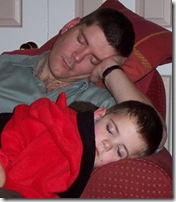 I got a Christmas card with a family photo in it yesterday. Casey’s first words when she saw the picture were, “Boy, Levi sure looks like his Dad!”
I got a Christmas card with a family photo in it yesterday. Casey’s first words when she saw the picture were, “Boy, Levi sure looks like his Dad!”
She was exactly right! The little boy bore a striking resemblance to his father. In fact, the word “likeness” means the quality of resembling, or corresponding to another.Â
I was once again struck by the wonder of Jesus becoming like us in order to make a way for us to become like Him! These verses even delineate what that means:
Amazing that Jesus was not ashamed to become like us.Â
The word “like” means to be “suitable or agreeable to, to feel attraction toward or pleasure in, to wish to have.”Â
Am I ashamed for others to see me agreeable to, taking pleasure in or wishing to have more of Jesus?Â
If my “like” does not result in “like-ness” to brother Jesus…whose likeness will I bear?
“You belong to your father, the devil, and you want to carry out your father’s desire. He was a murderer from the beginning, not holding to the truth, for there is no truth in him. When he lies, he speaks his native language, for he is a liar and the father of lies.” (John 8:44)
Yesterday, I heard a sermon from 1 Peter entitled “A Living Hope”. Last night, I talked with a friend who shared her excitement that she may be able to adopt a little 1 year old boy after the first of the year.
She knew that was the hook I needed to keep me on the phone when the Survivor China finale was on!
She and her husband have two other adopted children and they have been praying for a few months about this particular little boy and how all the finances and other considerations might be worked out.
Well, the “God story” piece of this call was that the little boy has an inheritance! His college education will be paid for as well as all the adoption costs! When my friend protested that this was not necessary…the response she got was, “You don’t understand, you cannot say ‘no’, it is an inheritance!’
That conversation must have been meant to seal the sermon on 1 Peter deeper in my heart because I have pondered it all morning.
This letter written to exiles whose lives were anything but hope filled was built around the idea of the sure hope that one can have in an inheritance.
Peter’s heart was as full as my friend’s when he spoke the truth to suffering saints as deep encouragement and powerful help to persevere.
He wanted them to see with the eyes of faith to the other side of the persecution and alienation that they were enduring.
Praise be to the God and Father of our Lord Jesus Christ!
In his great mercy he has given us new birth into a living hope through the resurrection of Jesus Christ from the dead, and into an inheritance that can never perish, spoil or fade—kept in heaven for you, who through faith are shielded by God’s power until the coming of the salvation that is ready to be revealed in the last time.
In this you greatly rejoice, though now for a little while you may have had to suffer grief in all kinds of trials. These have come so that your faith—of greater worth than gold, which perishes even though refined by fire—may be proved genuine and may result in praise, glory and honor when Jesus Christ is revealed.
Though you have not seen him, you love him; and even though you do not see him now, you believe in him and are filled with an inexpressible and glorious joy, for you are receiving the goal of your faith, the salvation of your souls.
1 Peter 1:3-9
I was struck by the interweaving of hope and faith in Peter’s words.
Hope has come to us as part of the new birth–we do not have to work it up–it is a grace gift!
However: The life he was promising as an inheritance contrasted with the reality they were living in the moment–their eyes saw people perishing, beauty and goodness spoiled by evil and light fading into suffocating darkness.
Why? Peter’s answer is that what we cannot see is more precious to God than what we can!
How grateful I am for my friend’s phone call!
God used her words to reorient my vision…there was a real Survivor finale that took place over 2000 years ago and His victory–having survived death– secured my inheritance—I have a Living Hope!
Though I have not seen Him — I love Him and the unbeckoned joy that wells up and generates inexpressible delight as I ponder Peter’s words is evidence that I am receiving in the present an installment on my future inheritance.
I can’t say “No” it is an inheritance!
Blessed be the God and Father of our Lord Jesus Christ!
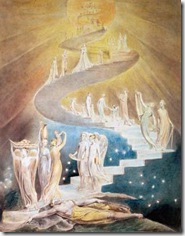 In Genesis 28, Jacob had a dream in which he saw a stairway that began on earth and whose top reached up into heaven. He saw angels ascending and descending on the stairs.
In Genesis 28, Jacob had a dream in which he saw a stairway that began on earth and whose top reached up into heaven. He saw angels ascending and descending on the stairs.
"There above it stood the LORD, and he said: "I am the LORD, the God of your father Abraham and the God of Isaac. All peoples on earth will be blessed through you and your offspring.
I am with you and will watch over you wherever you go, and I will bring you back to this land. I will not leave you until I have done what I have promised you." Genesis 28:13-15
Jacob concluded that he had been given the site where he had had the dream because it was the gateway to heaven. It was Jesus in John 1:51 gave us the proper interpretation of the dream.
"He then added, I tell you the truth, you shall see heaven open, and the angels of God ascending and descending on the Son of Man."
Jesus was Jacob’s ladder! The Word became flesh and dwelt among us. He became the gate of heaven. This doctrine is absolutely revolutionary. See, the ladder is not something we ascend toward heaven. Rather it is Jesus himself descending from the glory of heaven to become the God-man, the suffering servant, the righteous branch, the Son of God and Son of man. It is not a metaphor of our ascent, but of Christ’s descent; not of our coming to Christ, but of Christ coming to us. Hence, Christ is the bridge from the infinite to the finite. Jesus was and is God saying, "Here I am–right in front of you! This is what I am like."
Someone once said that Christianity is not a religion because religion consists in humans trying to reach God, while Christianity is a matter of God reaching humans. ((Michael Horton, Putting Amazing back into Grace, Baker Books, p.92-97))
I continue to be drawn to the blog site paradoxuganda written by Doctors Scott and Jennifer Myhre. Here are two entries that compel me to see the news of an epidemic as more than cold abstract statistics. When I read her words, this story of ebola is no longer vague and distant–I am drawn in to pray and be involved in heart and mind–the words become flesh. I am struck again by the power of the word–they communicate more than information– behind and underneath what is written you can sense love and compassion–pain and sorrow–weeping and persevering. It is a Christmas story.
 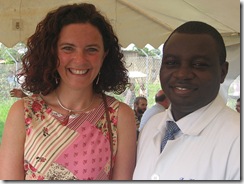 “Scott was speaking today to one of the World Health Organization visitors who related information from the MSF doctors who cared for Jonah at the end. It was spine-tingling to hear Jonah speak from beyond the veil….
“Scott was speaking today to one of the World Health Organization visitors who related information from the MSF doctors who cared for Jonah at the end. It was spine-tingling to hear Jonah speak from beyond the veil….
Tuesday afternoon, he was still walking and talking, and said to them “I have seen these patients die, and I know that I am dyingâ€. I don’t think they believed him, and I wonder now if that is why he was determined to call us though his efforts were not successful. Moments before he died he said “I am going to die now. And I pray that no one should ever have to die of this disease again.â€
 Right to his last moment he was thinking like the compassionate doctor he was, looking beyond himself to others.
Right to his last moment he was thinking like the compassionate doctor he was, looking beyond himself to others.
Tomorrow his body will arrive, having been carefully decontaminated (as far as possible) and enclosed. His family was still en route when I last talked to them a couple of hours ago. Whenever we speak of him again to someone who cared about him, the tears come freely. We have seen some men here cry like we never saw men cry before. 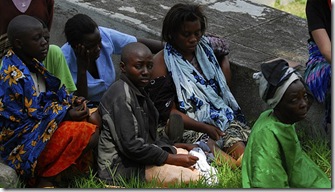 I think Jonah was perceived as a resource, a gift, to the whole district, everyone feels bereaved and robbed of their man, their doctor, the one they could trust and count on. When we see his family, we will have the complication that they are now contacts too like we are, and we should not be touching each other. So we have to go to the burial of our dear friend without any hugging, comfort his wife and children without touch. That feels harsh.
I think Jonah was perceived as a resource, a gift, to the whole district, everyone feels bereaved and robbed of their man, their doctor, the one they could trust and count on. When we see his family, we will have the complication that they are now contacts too like we are, and we should not be touching each other. So we have to go to the burial of our dear friend without any hugging, comfort his wife and children without touch. That feels harsh.
My mind keeps reaching back to some words of the Psalms which I can’t place, though a thousand have fallen at my side, yet I will trust.

We feel the falling of Jonah so acutely, we were both on the same front line of the same battle fighting side by side, yet he went down and we have not.
I know I can’t trust in anything other than God . . . Certainly not in not dying, which is not guaranteed, as Jonah shows. If we make it through this then what about the next tragedy?
Safety is not the basis of trust. Instead our trust needs to be in God, inexplicable God, dangerous God, other-than-us God, who does not order this world according to our will, but knows more than we do and loves more deeply.”
Posted by DrsMyhre at 11:08 AM
Â
“This afternoon seven of the eight boys who are my kids’ close friends hung out playing cards. I tried to explain ebola, most of these boys are CSB students 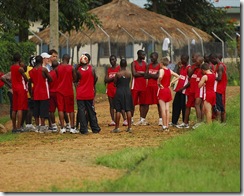 whom we sponsor. They asked good questions, but one got me thinking: Is this disease only in Africa, or is it in other parts of the world? I felt disloyal, or sad, to admit that all the major outbreaks had occurred relatively close (on a global scale) to where we now sit, in eastern Congo, southern Sudan, northern Uganda. Almost the only time the filovirus has been found elsewhere was when it was inadvertently transported out in monkeys from Uganda. I could see the world-wide image of Africa, the continent of disease, being reinforced once again. And it is not just a matter of how uninformed or prejudiced westerners view Africa, the assumptions are so powerful they trickle down into the minds of these boys. It seems unfair that Bundibugyo only gets the five minutes of world attention because of yet another disease.”
whom we sponsor. They asked good questions, but one got me thinking: Is this disease only in Africa, or is it in other parts of the world? I felt disloyal, or sad, to admit that all the major outbreaks had occurred relatively close (on a global scale) to where we now sit, in eastern Congo, southern Sudan, northern Uganda. Almost the only time the filovirus has been found elsewhere was when it was inadvertently transported out in monkeys from Uganda. I could see the world-wide image of Africa, the continent of disease, being reinforced once again. And it is not just a matter of how uninformed or prejudiced westerners view Africa, the assumptions are so powerful they trickle down into the minds of these boys. It seems unfair that Bundibugyo only gets the five minutes of world attention because of yet another disease.”
Posted by DrsMyhre at 7:54 AM